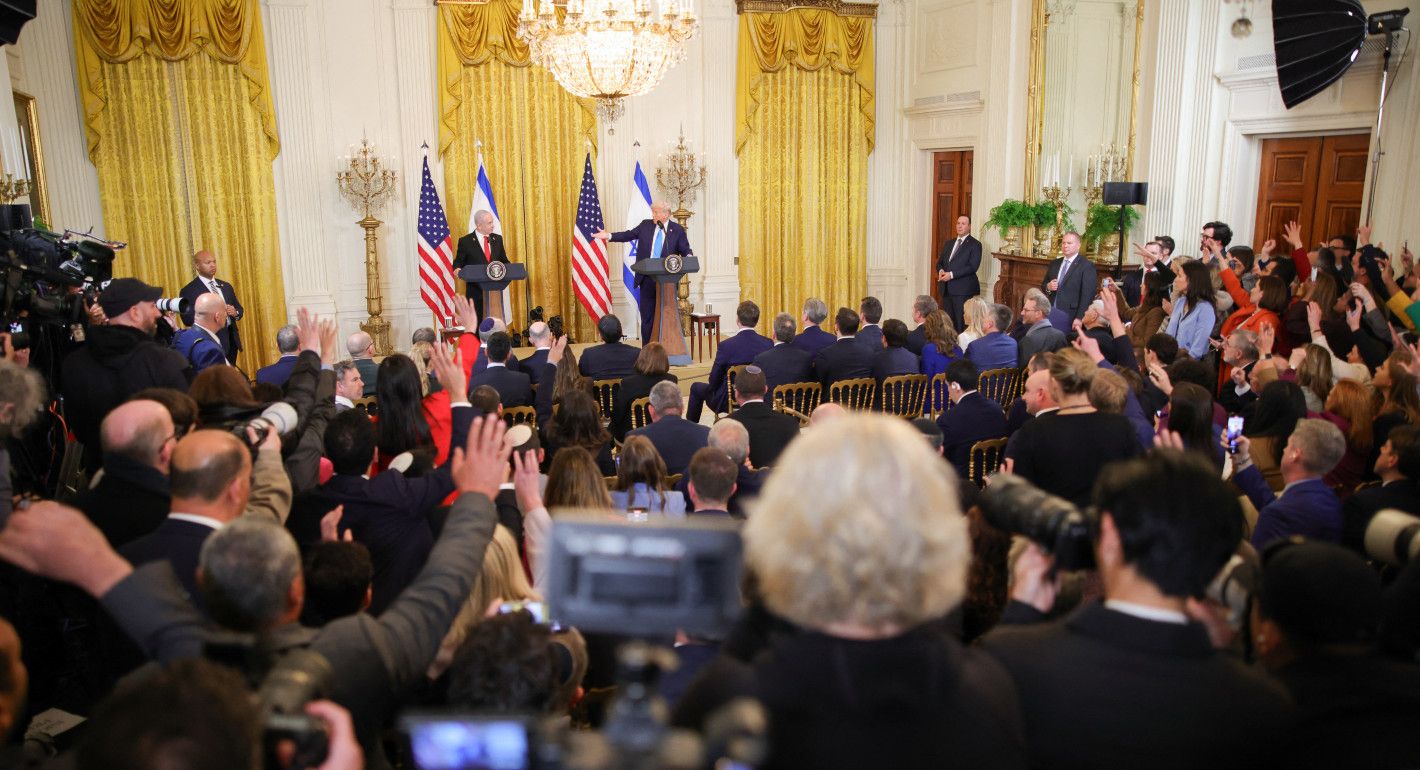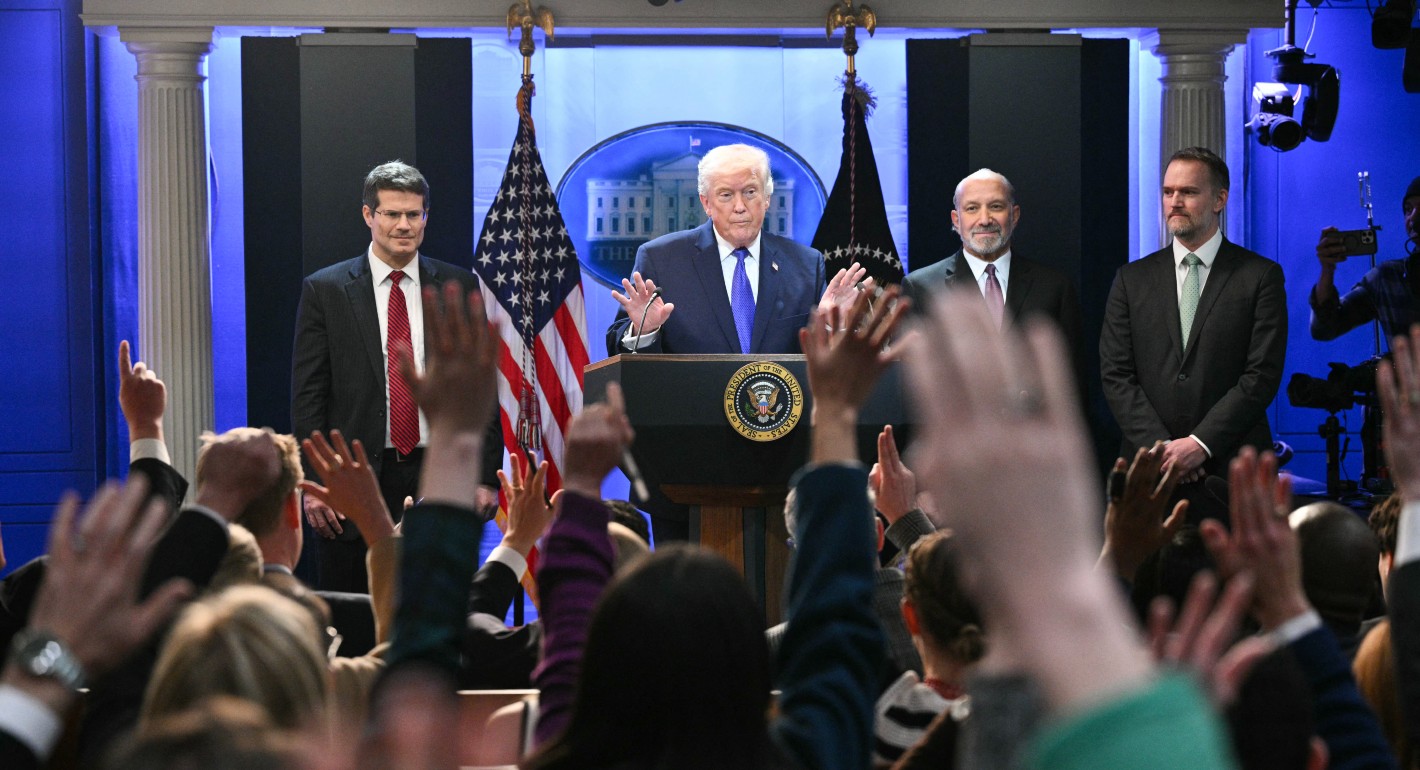Amr Hamzawy, Sarah Yerkes, Kathryn Selfe
{
"authors": [
"Amr Hamzawy"
],
"type": "commentary",
"blog": "Emissary",
"centerAffiliationAll": "dc",
"centers": [
"Carnegie Endowment for International Peace"
],
"englishNewsletterAll": "menaTransitions",
"nonEnglishNewsletterAll": "",
"primaryCenter": "Carnegie Endowment for International Peace",
"programAffiliation": "MEP",
"programs": [
"Middle East"
],
"projects": [],
"regions": [
"Middle East",
"Egypt",
"Jordan",
"Saudi Arabia",
"Israel",
"Palestine",
"United States"
],
"topics": [
"Domestic Politics",
"Foreign Policy"
]
}
Netanyahu and Trump hold a press conference at the White House on February 4. (Photo by Bryan Dozier/Middle East Images/AFP via Getty Images)
Trump’s Gaza Plan Is Not in America’s Interests
The president must realize there is no potential for a deal, and only one of two possible choices would advance U.S. interests in the region.
The past few weeks have been bewildering for Palestinians in Gaza, their Arab neighbors, and much of the world. U.S. President Donald Trump’s comments on Gaza have sparked outrage across the region and the world. The deal-obsessed president must realize that there is no potential for a bargain here—only two choices.
One is to ally with the Israeli far right, continue to promote the displacement of Palestinians in Gaza, endorse Israel’s plans to annex the West Bank, and lose the United States’ Arab allies. The other is to disengage with the Israeli government and any displacement and annexation plans, collaborate with Arab and European partners on the ceasefire and reconstruction, and work with the Arabs to revive peace and normalization talks in the Middle East. Only the latter is in the U.S.’s national and security interests.
Weeks of Whiplash
At a press conference on Tuesday with Israeli Prime Minister Benjamin Netanyahu, Trump renewed global outrage by calling for the displacement of Palestinians from Gaza. This time, he suggested that the United States should assume direct control over the Gaza Strip and develop it to become the “Riviera of the Middle East” open to “the peoples of the world” to live in.
Several administration officials, including National Security Advisor Michael Waltz and Middle East special envoy Steve Witkoff, attempted to walk back the president’s proposal. They argued that his words should be interpreted as a desire to improve Palestinians’ futures and to promote reconstruction efforts. White House Press Secretary Karoline Leavitt stated that the administration does not intend to send U.S. troops to assume control over Gaza. But on Thursday morning, Trump reiterated his plan to have the United States take control of Gaza.
Trump has referred to “cleaning out” Gaza of its residents and demanded that Egypt and Jordan receive displaced Palestinians multiple times in recent weeks. By means of explaining his ethnic cleansing ideas, Trump has argued that Gaza’s reconstruction would take ten to fifteen years and that the living conditions of more than 2 million Palestinians would be inhumane throughout this period. Gaza’s fortunes, he says, would only change if its population leaves it, and economic development efforts are unleashed, so that new inhabitants—not its current Palestinian population—can live in peace and prosperity.
Trump has also said he would announce a position on Israel’s moves to annex the West Bank in the coming weeks. Since the beginning of the Gaza ceasefire, violence has been on the rise in the West Bank. The Israeli far right’s plan to terrorize Palestinians, increase settlement activities, and ultimately to annex the West Bank has been met with initial endorsement by the Trump administration. Trump has said that he understands the rationale behind the annexation plans because Israel is a small country that could use more territory.
Trump’s repeated reiteration of both displacement and annexation plans appears as if he is offering Netanyahu and his government a huge, strategic reward for the destruction it wreaked on Gaza. At the same time, the rejection of these plans has been global, overwhelming, and destabilizing, with Palestinians, U.S. allies Egypt and Jordan, and the wider Arab world warning of total instability and security failure in the region should the plans be implemented.
Annexation and Displacement Are Nonstarters
For Palestinians, annexation and displacement would mean the elimination of the dream that they have held fast to since 1948: self-determination and an independent state. They know very well that leaving their lands and homes, even if they are told that it is temporary, will result in a permanent departure—the collapse of the right of return and lives spent in eternal refugee camps.
The Egyptians and Jordanians also reject the Gaza displacement and West Bank annexation plans. For them, as for many others, both plans are practically equivalent to liquidating the Palestinian cause, which neither Cairo nor Amman can abandon. These plans would also put at risk and violate the terms of the agreements that brought peace between Cairo and Tel Aviv in the 1970s and Amman and Tel Aviv in the 1990s. Both Egypt and Jordan transformed their regional policies to partner with Washington during the various rounds of peace negotiations between Israel and the Palestinians, as well as to develop security frameworks for all parties in a region that has long been plagued by wars and crises. In addition, receiving more refugees, whether from Gaza or the West Bank, would violate Egypt’s and Jordan’s own sovereignty and sense of national security.
Saudi Arabia, which the first Trump administration wanted to include in the Abraham Accords and which the Joe Biden administration sought to push toward normalization with Israel, also opposes the displacement and annexation plans. Both plans would bring an end to the 2002 Arab Peace Initiative, which Saudi Arabia sponsored. That initiative calls for an independent Palestinian state based on the 1967 borders, in return for comprehensive Arab normalization with Israel. After Trump’s Tuesday comments, the Saudi foreign ministry reiterated—almost instantly—the kingdom’s opposition to displacing the Palestinian people out of their homeland and reaffirmed that normalizing relations with Israel is tied to the establishment of a Palestinian state.
This puts Saudi Arabia in particular in a bind. Its young leadership, above all Crown Prince Mohammed bin Salman, has desperately sought security guarantees and peaceful nuclear technology from Washington. But Washington links these items with normalization—a path Riyadh will not be able to follow while the Israeli far right is devouring the West Bank and seeking the displacement of Palestinians from Gaza.
Potential U.S. and Israeli efforts to persuade other Gulf states, such as the United Arab Emirates and Qatar, to tolerate the annexation and displacement plans will inevitably fail. Their foreign ministers, along with those of Egypt, Jordan, and Saudi Arabia, as well as representatives from the Palestine Liberation Organization and the Arab League, met to discuss their collective rejection of the liquidation of the Palestinian cause, their support for the Palestinian people to remain in their homeland, and their resolve to accelerate reconstruction efforts in Gaza. Their statement should be examined carefully by the U.S. administration. Its categorical language dismissing annexation and displacement plans is a reminder of past moments of Arab unity and animosity toward the United States in the face of its one-sided support for Israel at the expense of legitimate Palestinian rights. This is not in America’s interest.
Upending Partnerships
By continuing to discuss and endorse displacement and annexation plans, Trump and his administration put the United States in positions that threaten its friendships and alliances with the Arabs.
Some may think that Washington alone holds all the cards in its relations with Cairo and Amman, largely due to the military and economic support it provides them. But the two neighbors of Israel and Palestine collaborate with the superpower in various military, security, and intelligence spheres to help safeguard American interests in the Middle East. Both Cairo and Amman bear the brunt of this challenge. The relationship is not a one-way street, and the Trump administration would be mistaken if it ignores the importance of sustained Egyptian and Jordanian contributions to the diplomacy and security of the Middle East. It would also be mistaken if it thinks that it can pressure Egyptian President Abdel Fattah al-Sisi and Jordanian King Abdullah II to receive displaced Gazans by offering more foreign aid, as the solidarity of the two governments and their citizens with Palestine is unwavering. They are also mobilized to defend their national security and to block U.S pressure from bearing its toxic fruits.
Likewise, the potential U.S. pressure on Saudi Arabia and other Gulf countries would result in them moving away from the United States and coordinating more with Egypt and Jordan. The Arab rejection of the annexation and displacement plans will provide a conducive regional context that helps the Palestinians, Egypt, and Jordan to stand firm in the face of Trump’s endorsement of the Israeli far right.
Against U.S. Interests
The administration’s plans will only backfire compared to its declared goals of disentangling the United States from the Middle East and promoting its stability and security. Neither will the situations in the West Bank and Gaza stabilize nor will the Palestinians have access to decent living conditions. Israel will neither achieve permanent security nor comprehensive normalization with the Arabs. The United States’ relations with its Arab friends will be shaken, and the conditions in the Middle East will force the superpower to further employ its military and security capabilities to protect its interests amid hostile conditions.
It is in the best interest of the United States that the Trump administration disengages from the Israeli far right and the annexation and displacement plans for the West Bank and Gaza. Instead, Trump should work with the Israeli government to reduce levels of violence in the West Bank and to extend the ceasefire deal in Gaza. The administration should coordinate and promote rebuilding efforts in Gaza with Arab and European countries, concentrating reconstruction in the less destroyed areas of the Gaza Strip.
The United States should not risk its good relations with the Arabs over illegal annexation and displacement plans. The result is bound to be less stability in the Middle East and deeper entanglement of the superpower in wars and conflicts—not a grand bargain. Instead, Trump should convene both sides—the Palestine Liberation Organization and the Israeli government—along with key Arab countries in a summit designed to revive negotiations based on the principles of land and self-determination for peace and normalization. It could lead to the best deal for all.
Emissary
The latest from Carnegie scholars on the world’s most pressing challenges, delivered to your inbox.
About the Author

Director, Middle East Program
Amr Hamzawy is a senior fellow and the director of the Carnegie Middle East Program. His research and writings focus on governance in the Middle East and North Africa, social vulnerability, and the different roles of governments and civil societies in the region.
- U.S. Peace Mediation in the Middle East: Lessons for the Gaza Peace PlanPaper
- The United States Should Apply the Arab Spring’s Lessons to Its Iran ResponseCommentary
Amr Hamzawy, Sarah Yerkes
Recent Work
Carnegie does not take institutional positions on public policy issues; the views represented herein are those of the author(s) and do not necessarily reflect the views of Carnegie, its staff, or its trustees.
More Work from Emissary
- Is a Conflict-Ending Solution Even Possible in Ukraine?Commentary
On the fourth anniversary of Russia’s full-scale invasion, Carnegie experts discuss the war’s impacts and what might come next.
- +1
Eric Ciaramella, Aaron David Miller, Alexandra Prokopenko, …
- Indian Americans Still Lean Left. Just Not as Reliably.Commentary
New data from the 2026 Indian American Attitudes Survey show that Democratic support has not fully rebounded from 2020.
- +1
Sumitra Badrinathan, Devesh Kapur, Andy Robaina, …
- Trump’s State of the Union Was as Light on Foreign Policy as He Is on StrategyCommentary
The speech addressed Iran but said little about Ukraine, China, Gaza, or other global sources of tension.
Aaron David Miller
- How Middle Powers Are Responding to Trump’s Tariff ShiftsCommentary
Despite considerable challenges, the CPTPP countries and the EU recognize the need for collective action.
Barbara Weisel
- What Happens When a Conservative Movement Continues on Without a Leader?Commentary
Lessons from Korea’s political right.
Darcie Draudt-Véjares













